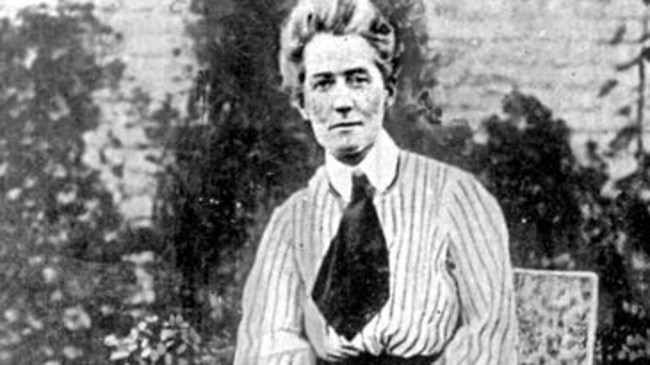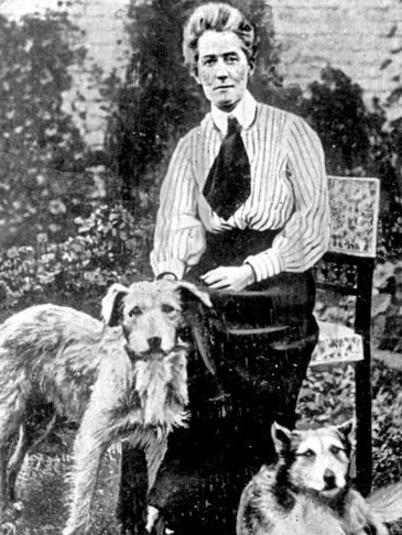England’s Joan of Arc abandoned to WWI firing squad
Convicted of treason for helping Allied soldiers flee Belgium, English nurse Edith Cavell was executed by a German firing squad at 2am 100 years ago today.

Today in History
Don't miss out on the headlines from Today in History. Followed categories will be added to My News.
‘Miss Cavell used to remark that a person’s vitality was at its lowest ebb between 2 and 4am, and she always went the rounds of the wards at 2am,” an Australian acquaintance of English nurse Edith Cavell recalled. A century ago today at 2am Cavell stood before eight gunmen in a German firing squad at the Belgian Tir National shooting range.
Reports of her execution for treason include accusations that it was rushed to prevent senior German authorities granting a pardon. Another says Cavell fainted on the way to the wall on the morning of October 12, 1915, collapsing to the ground where she was shot dead by the German commanding officer.
Yet another says the execution proceeded as normal, with eight soldiers shooting Cavell, along with four men also convicted of espionage and treason. Mary Watson, who had trained with Cavell in London, told Australian newspapers she recalled “a charming, noble and unselfish woman ... universally esteemed by patients and nurses alike”.
Mourned as an English Joan of Arc, Cavell was born on December 4, 1865, in Swardeston, Norfolk, where her father Frederick, assisted by wife Louisa, was an Anglican vicar for 45 years. As she grew up, the family took portions of their Sunday dinner to share with impoverished local families.

Cavell became a governess at 20 and in 1888 travelled to Austria and Bavaria, where she began visiting a free hospital and gave money to fund surgical instruments. In 1890 she wrote to a cousin: “Some day I am going to do something useful ... for people. They are, most of them, so helpless, so hurt and so unhappy.”
In 1895 Cavell applied to train as a nurse at London’s Fountains Fever Hospital and later began general training at the London Hospital, overseen by matron Eva Luckes.
Awarded her hospital certificate in 1898, in November 1903 Cavell became assistant matron at the Shoreditch Infirmary. In 1907, Belgian doctor Antoine Depage approached Cavell about a position as matron at the Berkendael Institute near Brussels, where he wanted to establish a progressive teaching hospital for nurses.
Cavell later wrote that nurse probationers wore “blue dresses with white aprons and white collars. The contrast they present to the nuns, in their heavy stiff robes … is the contrast of the unhygienic past with the enlightened present.”
Cavell was visiting family when war broke out, but returned to Brussels to tend war victims at Berkendael, which became a Red Cross hospital. Cavell instructed nurses that their first duty was to help the wounded, no matter which army they served.
After the Battle of Mons cut off British Expeditionary Force soldiers, Germans posted notices warning Allied soldiers who did not surrender would be shot, along with those who harboured them. Two wounded British soldiers who evaded capture were passed from safe houses to a convent, then directed to Cavell. She gave them beds in the surgical house until they made a run for the Dutch border.
The local resistance was under German scrutiny by June 1915 when two soldiers, one of them Georges Gaston Quien, later suspected of betraying Cavell, arrived at the institute. Cavell had helped up to 200 people, among them Belgian and French civilians, to escape by the time German officers arrived for her on August 5. Cavell was questioned then held at St Gilles prison for 10 weeks. A secret court prosecuted her for “conducting soldiers to the enemy”.
The American minister in Brussels, Brand Whitlock, made desperate attempts to save her.
The British Foreign Office declared itself “powerless” to act and the Undersecretary for Foreign Affairs Robert Cecil decided any representation by the office would “do her more harm than good”.
Cavell’s death built favourable sentiment towards the Allies in the neutral US, and became a powerful propaganda tool in Britain, with “Remember Edith Cavell” printed on military recruitment posters.
Originally published as England’s Joan of Arc abandoned to WWI firing squad


